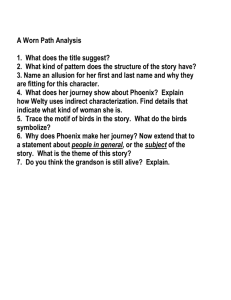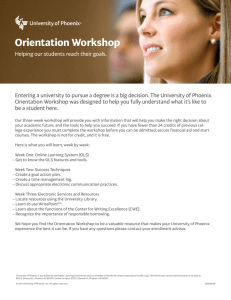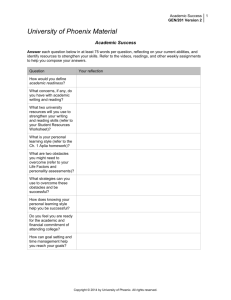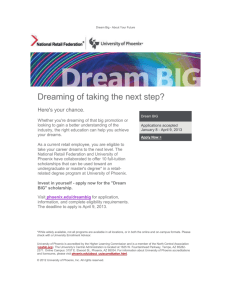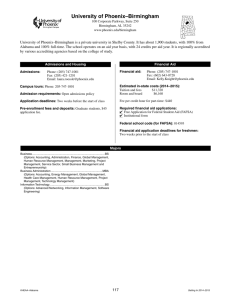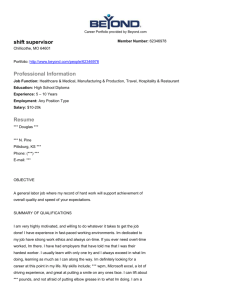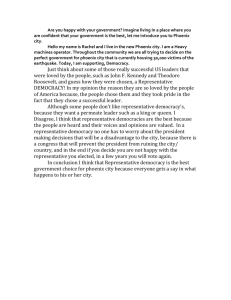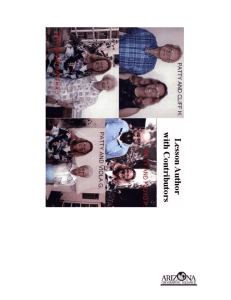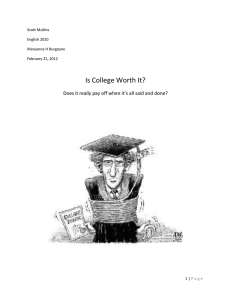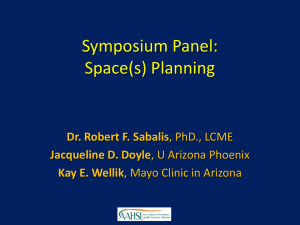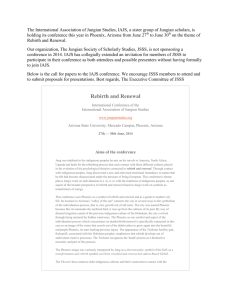UNIVERSITY OF PHOENIX - Emerald Group Publishing
advertisement
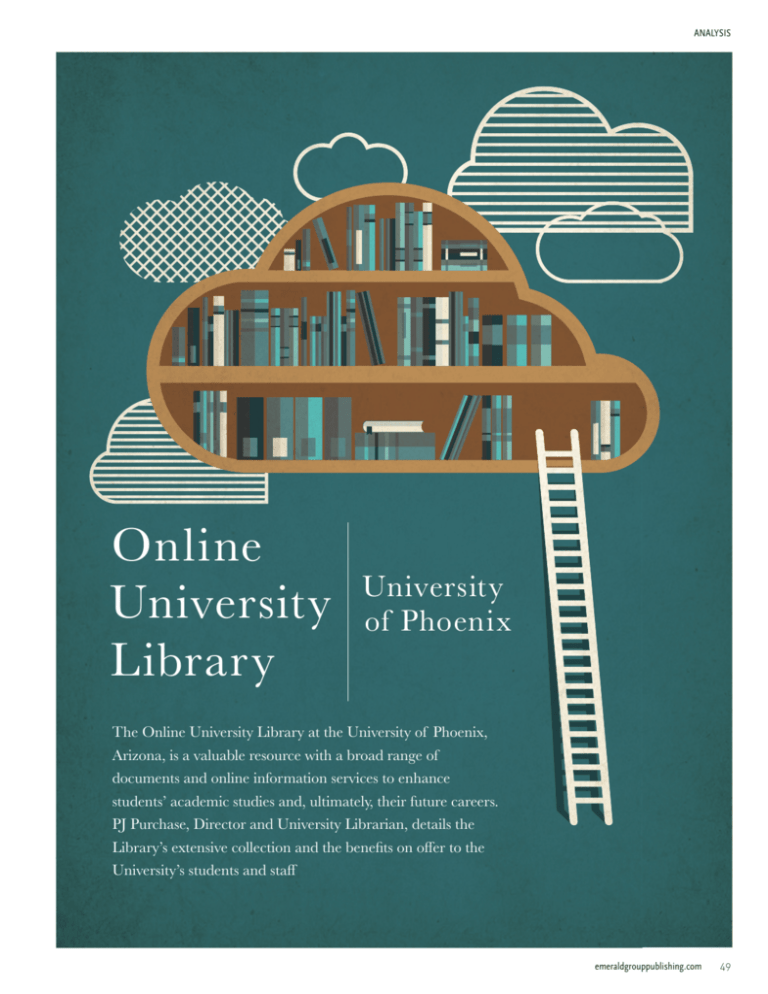
ANALYSIS Online University Library University of Phoenix The Online University Library at the University of Phoenix, Arizona, is a valuable resource with a broad range of documents and online information services to enhance students’ academic studies and, ultimately, their future careers. PJ Purchase, Director and University Librarian, details the Library’s extensive collection and the benefits on offer to the University’s students and staff emeraldgrouppublishing.com 49 To begin, could you introduce your role as Director and University Librarian at the University of Phoenix? I began working with the University Library in 2000 and took up the Director role in 2008. As the Director, I am tasked with the overall strategic direction of our collection and services, ensuring we meet the needs of varied user groups. I see my primary function as being the Library’s main representative to our constituent groups. It is imperative that I work closely with internal stakeholders to capitalize on opportunities to add value to the University and demonstrate its impact on student learning. This involves many committees and meetings. When developing the strategic plan for the University Library, what are your key considerations? First and foremost is the direction of the University as a whole. At present, we are in the midst of a major organizational change. When creating our FY2015 strategic plan the Library’s stakeholders radically changed, the mission and vision of the university were refocused, programmes were in ‘teach out’ mode and new programmes were created. Therefore, the Library established a newly revived mission, new processes and more involvement from a range of stakeholder groups. I perform strategic planning yearly rather than every two-three years, but with that said, I do have long-term goals, and it is the tactical strategies and objectives of each of those goals that are addressed in each annual plan. How extensive is the Online University Library at present and in what way does it support management education? How do you view the evolution of resources for those studying and researching management? Our collection comprises over 190,000 eBook titles and over 60,000 unique full text journals. We offer over a dozen management and financial reporting tools, thousands of reference materials, 20 multimedia repositories, as well as best practice research. We support management education through the use of current materials in the form of journals, datasets and multimedia. Our students are no longer just looking for those germinal and seminal journals. Today’s students want the latest information and best practices from a global vantage point. Online/self-publishing, grey literature and social media are all becoming valid sources for research. In what ways are the Library’s collection development policies aligned with the University’s overall mission? Our collection development policies aim to seek information that directly relates to the curriculum we teach and research we undertake. We curate and 50 BUSINESS & MANAGEMENT RESEARCH FOCUS provide access to digital content by adapting strategies that anticipate the needs of our students. The goal of the University is to change the lives of students and their communities through higher education. Thinking beyond graduation, the Library supports that endeavour by exposing our students to research materials they will utilize in their professional life. We strive to instil research and critical thinking skills students can rely on after their graduation. To what degree does the University of Phoenix Library differ from other university libraries? Because the University uses the same digital library to serve all students regardless of location, we have a centralized staff that serves our varied student populations equally. As such, we can do so without the disparities between small and large campuses that often arise with physical library resources. Additionally, becoming the archive of knowledge is not in our mission; this allows us the ability to be nimble and create collections that react to changes in our curriculum, technology and publishing as they happen. You are responsible for founding the Library Review Council of which you are currently Chair. Could you elaborate on the purpose of the Council and how it benefits the university as a whole? The purpose of convening the Library Review Council was to engage internal stakeholders in the University Library’s collection development process. The Council, made up of representatives from each college, assists the Library in PJ Purchase’s colleague Dr Holly Rick provides an insight into the landscape of management education and research in North America “Undergraduate management education is one of the fastest growing fields. We are now expecting more out of our management (future) employees in terms of them being able to think critically, and make rapid decisions that are backed with tried and true data. In addition, we expect future managers to grow employees in terms of innovation, motivation or grit and collaboration. With that said, having management students who can find and access information in a time of big data is clearly one struggle. I see more cross-disciplinary research, a need for more change management research as it impacts people/ culture/globalization, etc. I see that more research needs to happen when it comes to how technology is affecting work/ work culture/work diversity/productivity, etc. Preparing management students to become knowledge users and having the abilities to work in a world where tacit knowledge transfer (innovation, leadership, vernacular, body language, intuition and emotional intelligence) will help to build the next generation of leaders. Critical thinking skills and leadership skills within an ambiguous organization will be needed. In the next three years, I predict that we are going to see further cross-functional areas collaborating on research, and more focus on employee performance and retention. There is a shift in the role that human resources play as a strategic advantage (retention and recruitment of talent where rote tasks will be outsourced), looking at the abilities of organizations to be flexible and develop alongside the changing demographic of how we work, how leadership works within a globalizing market, identification of new frameworks of successful businesses and leadership, and how leaders are going to embrace/prepare/communicate and initiate change.” Holly Rick, PhD, MBA, MLS, Research and Assessment Librarian evaluating potential resources and provides feedback concerning the adoption of library resources. Council meetings foster a dialogue between the Library and our colleges which is an essential element in proactively creating collections which react to changes within the University and ensuring we are fully supporting the research needs of our students. In what ways does the Council foster collaborations between colleges and the Library? Why was it important for you to establish this organization? By fostering open dialogue between colleges and the Library, and involving the Library in the critical requirements of each programme, we ensure that we are not just reacting to change but are now a partner in those changes. Likewise, in what capacity do you work to forge relationships between industry, academia and government? We seek collaborations with other libraries, content publishers, commercial and open access enterprises, in order to maximize our access to research material. I sit on the academic boards of a few of our publishers and content partners, this enables us to have a voice in the development of content and pricing strategies. More broadly, how does the University of Phoenix Library encourage and support education and career development? by providing access to research, career development, and testing materials. However, our biggest opportunity lies within our information literacy work; as it is essential for our students to develop strong information literacy and critical thinking skills. I believe today’s workforce utilizes information to become agents of change, to be innovators, to be fully engaged in their field of expertize. I believe our students should fully understand how to quickly conduce online research to access meaningful information which can be critically analysed and used in the decision making process. I believe that ‘knowledge is power’ and understanding how to effectively access and utilize knowledge in the digital age, is a powerful component of any education. In the coming years, where else do you foresee the University of Phoenix Library developing? As the University of Phoenix leads the charge in online education, I see the Library’s role as a ‘shepherd of information’, not as the information gatekeeper. We are doing this work by removing barriers to content through the use of innovative technologies, by creating liaison librarians to work directly with colleges to ensure our collection meets the needs of our users and by developing research opportunities for our scholars. Lastly, we are increasing our focus on assessment to ensure we accurately measure the Library and librarian’s impact on student outcomes. Providing career relevant higher education is the University’s main focus; therefore, all academic units are aligned to support this driver. The Library participates emeraldgrouppublishing.com 51
